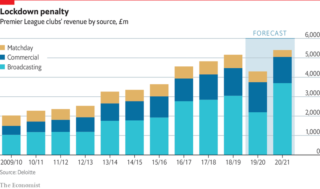Luckily it still has plenty of eager football fans watching at home
THE PREMIER LEAGUE, the top tier of English football, is set to resume play on June 17th after a three-month, coronavirus-induced hiatus. After considering several less desirable options—including awarding final league positions on a points-per-game basis and voiding the current season entirely—clubs eventually decided to play the remaining 92 matches behind closed doors over the next six weeks. The return to action, dubbed “Project Restart”, will give a boost to the country’s morale as well as to clubs’ bottom lines.
Television-rights revenue may have been the deciding factor. Such fees totalled just over £3bn ($3.8bn) in the 2018-19 season, or roughly 60% of clubs’ total income. Had clubs opted not to play the outstanding matches, they would have had to return some of this cash to broadcasters, refunding up to £760m ($955m) according to some estimates. This would have piled yet more pressure on an already loss-making set-up: the 20 clubs in the league recorded a cumulative pre-tax loss of £165m last season.
Finishing the season under the current plan will be costly, nonetheless. Broadcasters are demanding that hundreds of millions of pounds be refunded, as the remaining matches will not be held at the times or in front of the crowds that their contract stipulated. Deloitte, an accounting firm, reckons that broadcasting revenue will fall by 28% to £2.2bn. Match-day earnings, which include general-admission and premium-ticket sales, are expected to fall by as much as 20%. With less trading in players expected because of the pandemic, clubs that balance their books by selling their stars to bigger teams may also struggle. Overall Deloitte estimates that total revenue could fall by more than £800m in 2019-20, to £4.3bn (see chart).
Yet it would be unwise to bet against the financial clout of the most-watched sports league in the world. Over the past 30 years, the Premier League has zoomed past its European counterparts to become the richest in the world. Last season, it generated as much income as Spain’s La Liga and Italy’s Serie A combined. Commercial interest remains solid. Months of empty stadiums will not make a life-threatening dent in teams’ finances: match-day income has long been falling as a share of total earnings. Apparently assuming Britons will not suffer a second wave of infections and lockdowns, Deloitte expects the league’s revenue in the 2020-21 season to reach a record-high £5.4bn ($6.8bn). As long as broadcasters around the world continue screening matches, the league should remain in relatively good financial health. And so the game will go on.
The Economist





